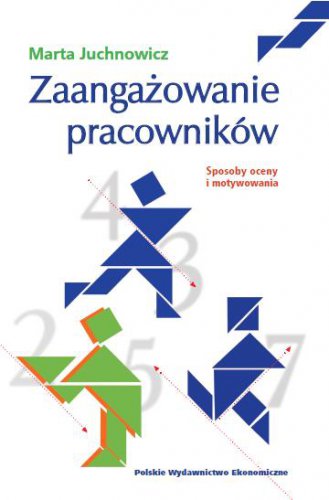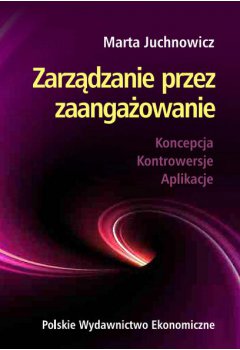Zaangażowanie pracowników. Sposoby oceny i motywowania
Publication date: 2012
Place publication: Warszawa
Publication: I
Binding: paperback
Format: 162x237
One of challenges experienced in contemporary management of human capital is that of having and maintaining a properly involved worker – an employee who has three crucial features at the same time: (1) the sense of identification with corporate aims and values, (2) the desire of belonging to the organization, (3) the will to undertake efforts that exceed the standard level.
A tendency to foster and develop such an attitude is an evidence of an increasing awareness that determined, creative, enthusiastic workers are the pivotal source for creation of the company value and that they are decisive to the company’s prospect on achieving a competitive advantage to a higher extent than any technological or financial factors.
Meanwhile, in the long-term perspective expert are signaling a phenomenon of declining levels of worker involvement and are perceiving considerable reserves in this respect.
At the same time, numerous studies carried out world-wide report about a great deal of benefits stemming from having workers that reveal high levels of involvement. Such benefits include better productivity, high level of creativity and innovativeness, stronger sense of loyalty toward the organization, and therefore a lower rate of fluctuation of key workers and stabilization of talent. Enterprises that employ poorly involved workers, on the other hand, experience high rates of absence, high level of stress, difficulties in decision making, shortages in effective communication, and internal political games.
The Author, S. Cook, indicates two crucial reasons of the increase of importance of worker involvement, evident on the global scale. These include the growing strength of the customer and the increasing power of the employee.
Therefore, the issue of worker involvement has become a mandatory standard in the area of human capital management.
Conscious development of effective involvement within an organization requires systemic research on the level of that factor and about factors that determine it, as well as undertaking efforts aimed at creation of desirable attitudes and behaviors of workers. These are the issues that make the principal object of discussion in the book.
Furthermore, also discussed are methods and techniques of influencing the professional activity of the employees. They are directed at fostering their involvement in the work and operation of organization, and are meant to assist the creation of the corporate value for its stakeholders. The Author, Marta Juchnowicz, presented as follows: changes occurring in the area of management of human capital in an organization; the essence of the concept of management through involvement; problems concerning the assessment and measuring of worker involvement; methods of assessment of organizational involvement and of involvement in work; methods of motivating in management through involvement; the system of motivating workers to stronger involvement.
The manual is intended for students of universities and faculties of economics, as well as for managers and entrepreneurs.
SPIS TREŚCI
Wstęp
Spis treści
1. Przyczyny szczególnego znaczenia zaangażowania pracowników w procesie zarządzania
1.1. Zarządzanie kapitałem ludzkim w turbulentnym otoczeniu
1.2. Paradygmat elastycznego zarządzania kapitałem ludzkim
1.3. Wymagania organizacji wiedzy
1.4. Wzrost znaczenia kultury organizacyjnej
1.5. Współczesne wyzwania wobec postaw pracowników w procesie pracy
2. Rola zaangażowania we współczesnym zarządzaniu
2.1. Istota zaangażowania pracownika z punktu widzenia zarządzania
2.2. Cechy zaangażowanego pracownika
2.3. Zjawiska „pętli” i „luki” zaangażowania
2.4. Znaczenie poziomu zaangażowania pracowników
2.5. Idea zarządzania przez zaangażowanie
3. Koncepcje oceny i pomiaru poziomu zaangażowania pracowników
3.1. Czynniki determinujące poziom zaangażowania pracowników
3.2. Model zaangażowania pracowników w organizację WIGOR
3.3. Sposoby pomiaru poziomu zaangażowania pracowników
4. Metoda oceny zaangażowania organizacyjnego oraz zaangażowania w pracę
4.1. Założenia metody
4.2. Metodyka badania
4.3. Diagnoza zaangażowania pracowników w organizacjach — przykład badania
4.3.1. Analiza poziomu zaangażowania pracowników w organizację
4.3.2. Czynniki determinujące zaangażowanie pracowników w organizację
4.4. Poziom zaangażowania pracowników w organizację a decyzje o zmianie miejsca pracy w świetle badań
4.5. Analiza poziomu zaangażowania w pracę
5. Motywowanie w zarządzaniu przez zaangażowanie
5.1. Nowe podejście do kształtowania aktywności zawodowej pracowników
5.2. Ewolucja istoty motywowania
5.3. Kultura zaufania fundamentem zarządzania przez zaangażowanie
5.4. Warunki skutecznego motywowania w zarządzaniu przez zaangażowanie
5.5. Budowanie zaangażowania w okresie dekoniunktury
6. System motywowania do zaangażowania pracowników
6.1. Zakres problemowy systemu motywacyjnego — system motywacyjny a system wynagrodzeń
6.2. Strategia motywacyjna
6.3. Wynagradzanie powiązane z kompetencjami
6.4. Wynagradzanie za efekty
6.5. Sposoby motywowania do współuczestnictwa
Bibliografia
Załączniki
Załącznik 1. Kwestionariusz ankiety dla pracowników
Załącznik 2. Kwestionariusz ankiety do firm
Załącznik 3. Kwestionariusz wywiadu z kadrą menedżerską
| Odbiór osobisty | 0 € |
| Kurier Inpost | 4 € |
| Kurier FedEX | 4 € |
| Inpost Paczkomaty | 4 € |
| Free delivery in Reader's Club | from 47 € |
Zarządzanie przez zaangażowanie
Publication date: 2010
Place publication: Warszawa
Publication: I
Binding: hard cover
Format: 162x237



